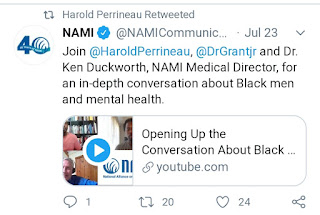It's upsetting to hear the lack of authority in your voice by contrast to the other two people in this conversation.
You'd think it wouldn't be like that, considering how much actors talk for a living. However, it is like that because the written and verbal materials worked with and the everyday interactions of people in professions for which a much higher level of education is a requirement give those professionals a breadth, authority and facility that the entertainment industry doesn't. In jobs where everyone has to be educated, everyone ends up smarter. I'm not calling you stupid; I'll call your profession educationally underserved in its entirety.
The conversation is worth hearing despite my disagreements with some of what's said. In the context of the interactions between black people and law enforcement, I don't dispute any of it.
Also:
-People are overdiagnosed and they are overmedicated. Not everything about the mental health care system is bad, but if you are interested in this subject, then it is important that you consider alternative perspectives. Researching the pharmaceutical industry's takeover of the medical establishment, the strangulation of psychotherapy by insurance companies, and the historical biases of the medical community on all axes will give you some idea of what you're dealing with. It is very frustrating to have had so many people write me off as not knowing what helplessness in the grip of a degrading and dangerous system is because I am white. That being said, I survived the system because of some of the advantages that being white and growing up on a college track gave me. I was able to figure out, finally, what was going on, but not before having lost the first half of my adult life to oppression, humiliation, and despair all wrought by that system's failures. I am still being tormented every day by people who are amused by the wreckage of my sad and awful, young adulthood. The system blames its failures on its patients, and so does the rest of the world. This occurs with impunity because the perception of mental health is far more susceptible to subjective interpretation than any other facet of medical care.
-The peer support community can be a resource for people who need social contact and to hear others' experiences. Whether or not it reinforces stigma or a sense of autonomy depends on the community. The medical establishment treats questioning of diagnosis and medication as life-threatening heresy, and there are peer support groups which reflect this type of reflexive admonishment. The insulin metaphor has been used for at least 30 years; it is misleading, inappropriate and coercive. The person who uses that metaphor in your discussion is not trying to be those things; I'll mention again that it has been very frustrating to have people write me off as not knowing what helplessness in the grip of an oppressive situation is. Oppression adminstered with a smile for your own good is harder to recognize at first and harder to fight, especially since nobody will believe you and getting angry isn't a safe option. It's even worse if you have told the oppressor your thoughts and feelings and sought the help, and the response is that you need a drug to solve what is wrong with you.
-My own experience informs most of my opinions. I have sometimes visited the website "Mad in America," but not often because I have enough on my mind already, having spent a decade and counting saying things such as "You can't have sex with children," "Stop promoting sexual harassment, stalking and femicide" and "Stop filming people in the bathroom" to pillars of society. You can try reading what that website and other resources for psychiatric survivors have to say.
-Homeless black men. You think that your heart is broken, but it won't be until you have tried to talk and listen to them.
-I don't know anything about your show and don't want to watch clips of it for now. I appreciate your genuine empathy, curiosity and interest in humanization and connection for people who are labeled. The entertainment industry, when it does address mental health, is far more often exploitative than not, and that is obviously not at all your goal. I hope that you won't be unintentionally exploitative by serving the oppressor in your portrayals; I don't know how else to say it.
-If, after researching all of the above, you want to change the show, don't be surprised if you are unable to do so because of the show's advertisers. Unable to do so.
-Don't ever bother me for anything. I hate your industry. I won't be back.
-
I don't have millions of dollars to protect my image, the way that celebrities do, and it shows. Here are quotes from Carey Martell, one...
-
Although my life is really awful, I am not in the dire situation described at the previous page. Unfortunately, I'll be 46 this summer...

